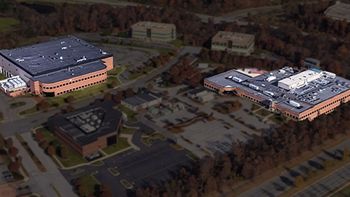
- Pharmaceutical Commerce - January/February 2016
Enterprise solutions for cold chain management
Chris Anderson (left), Cardinal Quality Systems Director, checks out the pallet shipper.
It’s a truism of large organizations that standardized, “enterprise” solutions are beneficial: less complexity when crossing organizational lines; more consistency in operating performance; and potential cost savings in inventories and equipment through sole-source suppliers. But when it comes to larger pharma companies and distributors handling temperature-controlled products, there are many factors that create obstacles to enterprise standards:
- Across multiple distribution centers, different cold chain products might exist, and different processes for managing them
- The complexity of distribution channels: bulk vs. parcel; national vs. international; regional variations due to seasonal (summer/winter) effects. Add to this the variability between intracompany transfers, shipments to large customers, drop shipments to smaller customers, and even the complexity of direct-to-patient deliveries.
- The lack of national (or international) service providers across the range of services required: ground and air transportation; suppliers of temperature management solutions; the unavailability of competency centers with logistics professionals meeting the evolving Good Distribution Practices (GDP) or FDA requirements.
The end result, for many larger organizations, is a proliferation of processes, technologies and logistics practices. The needed packaging materials and technical resources might not be available when and where they’re needed. Mistakes happen—something everyone in the pharma supply chain wants to minimize.
This was the situation confronting Chris Anderson, Director of Quality Systems at Cardinal Health, one of the leading US healthcare products distributors. Over a period now nearly a decade long, he has been instrumental in bringing a new level of performance to Cardinal’s vast and far-flung distribution organization, with distribution centers across the country, upgrading Cardinal’s performance in managing temperature-controlled products (even as the regulatory system for those products has evolved and become more restrictive). With the razor-thin margins that large distributors operate under, changes and upgrades had to meet tough ROI limits. Along the way, a new emphasis appeared on employing high-sustainability business practices—a challenge for distributors who, like Cardinal, are so tied to transportation and packaging practices.
“It’s funny,” says Anderson, looking back on the years of upgrades. “This started out as almost a test project because I had recently been trained in Six-Sigma quality practices, and was looking for an internal project with which I could earn my Black Belt. But the success of each project generated momentum for the next, bigger project, and with the strong backing of my management, we’ve been able to produce significant savings and quality improvements in our organization.”
Along the way, a relationship between Cardinal and Sonoco ThermoSafe evolved, from being one of “dozens” of vendors supplying packaging materials, to virtually the sole source provider, enabling Anderson and his team not just to standardize on specific types of packaging (for specific shipping situations) but also to unify packout processes, raise performance, and—most importantly—create significant savings and reduced spoilage. “Sonoco ThermoSafe has been a good partner, in that they work with us to develop customized solutions to fit our needs,” says Anderson.
The icing on the cake: many of Sonoco ThermoSafe’s solutions used within the Cardinal supply chain are designed to be reusable, drastically cutting the amount of packaging materials that need to be discarded, and simplifying shipping processes (such as avoiding the use of under-capacity refrigerated trucks in place of full loads of regular trucking). Big wins all around, says Anderson.
Anderson’s work on standardizing cold chain practices began around 2007, when Cardinal looked to reduce spoilage of shipments to local pharmacies. By standardizing internal processes, the company was able to reduce spoiled product returned to Cardinal by nearly half. Continued development in this area led to employing Sonoco ThermoSafe’s PureTemp® phase change panels, which provide temperature-specific cooling, in the totes with which Cardinal ships products to local pharmacies.
Sonoco ThermoSafe’s PureTemp® panels are a component of shipping totes of cold-chain products to pharmacies.
Data Anderson collects shows that the PureTemp panels would be cost-effective if they could be reused at least eight times. As of 2015, the PureTemp panels are actually being reused as many as 87 times—a 10X rate above break-even. Spoiled product returns have been cut by 85%—and this is over a period where the volume of cold chain product grew by 50%, now approaching $21 billion per year.
Anderson then addressed another problem: bulk shipments from the Cardinal “replenishment center” (where many manufacturers deliver their products) to the forward distribution centers across the country that serve regional deliveries (there are more than 20). “We started, years ago, with employing refrigerated trucks, then looked at using trucks with a moveable bulkhead to separate an ambient-temperature section from a refrigerated section,” says Anderson. “The problem with that is that the bulkhead takes up the space of four pallets, significantly reducing our carrying capacity.” The solution: working with Sonoco ThermoSafe to develop a reusable bulk shipper (now being marketed by Sonoco ThermoSafe as the 884 bulk durable insulated container), featuring a hard-plastic insulated shell, designed shelving for placing refrigerant bottles, and qualified for 72-hour service in a controlled room-temperature trailer and 24-hour service for ambient ground or air transportation.
Again, reusability was key. Anderson says his team calculated that the bulk containers would need to be capable of 10 reuses to be cost-effective. In fact, the units, in service since 2014, are essentially a permanent capital asset: their reuse has clocked in at 162X—growing week by week. The bulk containers allow Cardinal to deploy its trailers carrying full loads of mixed room-temperature and refrigerated product, providing economics in shipping costs and effective segregation of both room-temperature products (some of which could be damaged by refrigeration) and cold-chain products. Hundreds of these bulk containers are now in use, every week. And when the comparison is made with the previous, single-use gaylord-type shipping containers (with tons of cardboard, wood and foam-plastic insulation)—the sustainability benefits are massive.Another, unforeseen, benefit came out of the design process. Conventional gaylords with fixed sides can represent a worker-safety issue, because workers can be injured while trying to load the first, or unload the last, product case from them. With the front-opening door on the 884 durable container, these safety risks are eliminated.
Yet another valuable aspect of the enterprise program has been the ability to conduct container repairs internally—within Cardinal facilities. Breakage during transportation is a reality that all supply chain managers deal with; the value proposition is to minimize repair costs and downtime. Working with Sonoco ThermoSafe technicians for training, Cardinal has been able to carry out repairs (mostly for minor damage) of all units that needed it, and, through September 2015, had a damage rate of 0.0015%—an astonishing number in the wholesale distribution business.
Sonoco ThermoSafe’s 884 Bulk Durable Insulated Containers, stacked.
The capabilities of the 884 durable containers were reviewed when Cardinal dealt with an emergency situation in its Puerto Rico operations, where Hurricane Sandy interrupted the availability of conventional bulk containers for air transport to and from the island. After some intensive qualification testing, the units were used in air transport, and have proven to be equally effective in maintaining pharmaceutical product quality, maintaining reusability, and saving on air freight costs (as compared to heavy, metal-sided unit-load devices).
The standardization process led by Anderson has been ongoing, including:
- Deliveries of specialty products to clinics, hospitals and doctors’ offices, with reusable containers and PureTemp® panels;
- Localized delivery in major cities where everyday deliveries occur to local pharmacies.
Through it all, Cardinal works with the design engineers at Sonoco ThermoSafe to achieve more reliable performance, cost savings, and sustainability.
A key factor in the Cardinal-Sonoco relationship is that the latter has 15 dedicated facilities around the country (and 335 corporate facilities around the world) from which parcel, case and bulk containers can be supplied. “In the past, we’ve had problems with the many suppliers we were using having resupply problems, because of weather, process upsets or other reasons,” notes Anderson. “We ourselves market Cardinal’s capabilities to service our customers from multiple locations, and it’s proven to be valuable to have our suppliers with the same capability.”
Cardinal’s innovations in its enterprise supply chain have been recognized by outside organizations: the tote program for local pharmacy deliveries was the winner of the HDMA Distribution Management Award, and was recognized as a Supply Chain Innovation in the annual Council of Supply Chain Management Professionals; both of these occurred in 2012.
The concept of “enterprise solutions” can be something of a marketing mirage when one looks at the details of what goes on across an actual, far-flung enterprise, but Cardinal is finding significant value in establishing enterprise-level practices across its diverse range of services, and in working with partners like Sonoco ThermoSafe to design, build and supply real enterprise solutions for the company.
Sponsored by Sonoco ThermoSafe
For information on how Sonoco ThermoSafe can add value to your supply chain, please visit
Articles in this issue
almost 10 years ago
Managing logistics partnerships in uncertain timesalmost 10 years ago
Vaccines manufacturers wrestle with public health policyalmost 10 years ago
The impact of the anti-vaccination lobbyalmost 10 years ago
Logistics providers confront a complex, global healthcare marketalmost 10 years ago
Digitized stress analysis improves blister performancealmost 10 years ago
Pharma logistics--so what?almost 10 years ago
Industry hit a record low number of FDA OPDP actions in 2015almost 10 years ago
Collaboration key to a healthy supply chain in 2016Newsletter
Stay ahead in the life sciences industry with Pharmaceutical Commerce, the latest news, trends, and strategies in drug distribution, commercialization, and market access.




